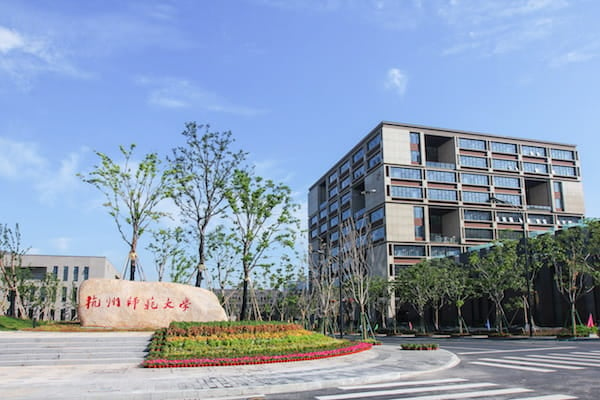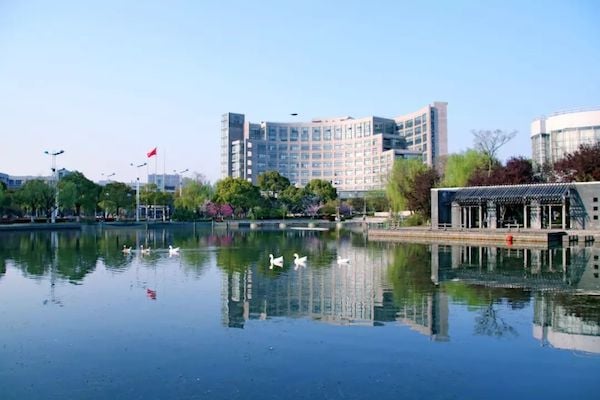Shanghai International Studies University
Introduction to Shanghai International Studies University
Shanghai International Studies University (上海外国语大学, website) was established in December 1949. It is the first higher foreign language institution established after the founding of New China. It is one of the birthplaces of foreign language education in New China. Engineering “and” double first-class “national key universities.
Shanghai International Studies University, formerly known as East China People’s Revolutionary University, has established Shanghai Russian School. The first principal was Jiang Chunfang, a well-known Russian translator, publisher, and founder of the Chinese Encyclopedia. Later, after undergoing a series of changes, including the Foreign Language Special School attached to the East China People’s Revolutionary University, the Shanghai Russian Specialized School, and the Shanghai Foreign Languages ??Institute, it was included in the National Key University of the Ministry of Education in 1963. Approved by the Ministry of Education in 1985, the school’s English school name was determined as “Shanghai International Studies University” (abbreviated as “SISU”), and it was officially renamed “Shanghai Foreign Studies University” in 1994.
Since its establishment, Shanghai International Studies University has maintained a leading academic advantage and a high level of teaching quality. It is the only one of its kind in the country to have three doctoral degree programs (foreign language and literature, political science, and business administration). Colleges and universities rank among the top in China in international indicators such as the QS World University Rankings, and have been rated A + (foreign language and literature) in the subject evaluation of the Ministry of Education, ranking first in the country.
Shanghai International Studies University strives to promote the construction of a “strategic language” and provides the most urgently needed key talent reserve for national and local development. There are currently 42 languages ??taught at home and abroad, including English, Russian, French, German, Spanish, Arabic, Japanese, Greek, Italian, Portuguese, Korean-Korean, Persian, Thai, Vietnamese , Indonesian, Swedish, Dutch, Hebrew, Ukrainian, Turkish, Hindi, Hungarian, Uzbek, Kazakh, Polish, Czech, Swahili, Serbian, Ukrainian Urdu, Malay, Javanese, Pashto, Tajik, Chinese and other 34 modern languages, with Latin, Ancient Greek, Esperanto, Sanskrit, Old English, Classical Syrian, Pahlavi 8 classical languages ??and international auxiliary language courses, including English, classical Nahuat.
At present, Shanghai and foreign countries have fully formed a disciplinary structure with a coordinated development of five major disciplines, including literature, education, economics, management, and law. There are 3 national key disciplines (English language and literature, Russian language and literature, Arabic language and literature [cultivation]), 1 national non-universal language undergraduate training base (Western European population), and 10 national characteristics Professional construction sites, foreign languages ??and literatures have entered the country’s “double first-class” construction disciplines list, and six disciplines, including foreign languages ??and literatures, politics, applied economics, education, journalism, and business management, have been included in the first-class disciplines of Shanghai universities (including foreign Language and Literature are A).
Shanghai International Studies University is the seat of the Asia-Pacific Working Group of the International Association of Colleges of Translation Institutes (CIUTI). It has one of the highest advanced translation colleges in Asia. It has opened all six official languages ??and language pairs in the United Nations. With the highest rating, it is the only professional conference interpreting school in China, including Hong Kong, Macao, and Taiwan. It ranks first in the world in English and Chinese.
Shanghai International Studies University currently has 47 undergraduate majors, including 33 language majors and 14 non-language majors; 7 first-level disciplines with master degree authorization points: foreign languages ??and literature, political science, applied economics, education, China Language and Literature, Journalism and Communication, and Business Administration. There are 39 second-level disciplines authorized for master’s degree; 7 master’s degrees authorized for professional degree: Master of Business Administration, Master of Translation, Master of Chinese International Education, Master of Finance, Master of Law, and International Business Master’s degree, master’s degree in journalism and communication; three first-level disciplines for doctoral degree authorizations: foreign languages ??and literature, political science, business administration, with 19 second-level disciplines for doctoral degree authorization; two postdoctoral research stations: foreign languages, politics.
The University actively serves the national “Belt and Road” initiative and the major strategy of “going out” of the culture, taking the lead in proposing a “multilingual +” excellent international talent training strategy, innovating the education model, improving the school level with connotation construction, and making every effort to participate in global affairs Generalists and specialists who are knowledgeable in different regions and fields, promote outstanding foreign language talents, multilingual high-end translation talents, multilingual international journalism and communications talents, creative talents without borders in business management, innovative talents in applied economics, foreign legal talents, international Organization of talent training.
Shanghai International Studies University has successively established a joint school system with Xinhua News Agency, China Daily, the Association of Chartered Certified Accountants (ACCA), China Business News Media (CBN), Shanghai Foreign Language Channel (ICS), etc. Triangle college credit recognition program. Shanghai International and the UK ’s FutureLearn platform have collaborated on MOOC exploration and practice, promoted the deep integration of information technology and teaching practice, and promoted the innovation of educational concepts.
Based on the comprehensive advantages of multilingualism, interdisciplinary, and cross-culturalism, Shanghai International Studies University proactively connects national and local strategies, continuously inherits and highlights the traditional characteristics of foreign languages ??and literature, and relies on new academic growth points in political science to bring together high-end Chinese and foreign research teams to collaborate. Innovatively build academic think tanks in colleges and universities, and enjoy a high academic status in the fields of language and literature, international relations, global communication, and regional country studies.
Shanghai International Studies University currently has a key humanities and social science research base of the Ministry of Education (Middle East Institute), a research base of the National Language Working Committee (China Foreign Language Strategy Research Center), and two co-constructed research bases of the Ministry of Foreign Affairs (China and Arab States). Research Center for Reform and Development, China-Japan-Korea Cooperative Research Center), 3 regional and national research bases of the Ministry of Education (EU Research Center, Russian Research Center, British Research Center), 2 Chinese and foreign humanities exchange research bases in the International Department of the Ministry of Education (China British Humanities and Communication Research Base, Sino-German Humanities and Communication Research Base), 2 Key Research Bases of Humanities and Social Sciences in Shanghai Universities (G20 Research Center, Shanghai English Education and Teaching Research Base), 2 Shanghai Philosophy and Social Science Innovation Research Bases (Chinese and Foreign Cultures) Soft power comparative research bases, regional country research bases from the perspective of language and culture circles), together with the Education Management Information Center of the Ministry of Education to build the International Comparative Research Center of Education Informatization, and the Shanghai People’s Government Development Research Center to build a foreign cultural policy Research base for social investigation and research in Shanghai Center points Center units.
More than 80 research institutes and academic groups at Shanghai International Studies University, with global governance and regional country research as the core, build a close application channel for government-industry-industry-research applications, and provide intelligence for national ministries and local governments to formulate and implement relevant policies Support and emerged a number of landmark scientific research results. Shanghai Foreign Studies Institute of the Middle East, China International Public Opinion Research Center, China Foreign Language Strategy Research Center, and British Research Center became the “CTTI Source Think Tank”. Shanghai and foreign countries have gradually built research venues for eye movement, EEG, and corpus technology, and established an interdisciplinary joint laboratory of translation and translation with HKUST Xunfei to promote the cross-research on linguistics, management, computer science and cognitive neuroscience, and promote artificial intelligence. Frontier exploration of intelligence and natural language processing research.
The university currently edits and publishes 14 academic journals, 7 of which have been selected as source journals and collected journals of the Chinese Social Science Citation Index (CSSCI). Among them, “Foreign Languages ??(Journal of Shanghai International Studies University)” received the first batch of key funding from the National Social Science Fund and was included by the American Modern Language Association (MLA). It is the only foreign language journal in the “National 30 Best Social Science News”. . Shanghai Foreign Languages ??is continuously strengthening the construction of academic websites with foreign language features, actively promoting the overseas publication of Chinese academic journals and the promotion of foreign translation of Chinese academic fine works, striving to enhance academic influence and international discourse power, and promote the prosperity and development of Chinese philosophy and social sciences.
Shanghai International Studies University is one of the earliest universities in New China to conduct foreign exchanges. At the beginning of the school, foreign experts worked in the university. Shanghai and abroad regard international education as a core development strategy. It has established cooperative relationships with more than 420 universities, cultural, educational and scientific research institutions and international organizations in 62 countries and regions. It is the first group in the world to cooperate with the United Nations headquarters and its branches, the European Union Universities that have signed cooperation framework agreements with the Commission and the European Parliament have joined international academic alliances such as the Asian-African Research International Alliance, the Sino-Russian Comprehensive University Alliance, and the China-Japan Cultural Exchange University Alliance.
Shanghai encourages young students to look at the world, grow up in a multicultural environment, and fully absorb the outstanding achievements and advanced experience of higher education in the world. In 2018, the proportion of undergraduate students from abroad (borders) visiting abroad was as high as 45%, and 65 national undergraduate committees have established international exchange programs for outstanding undergraduates, and 84 graduate students have been funded by the national base committee to send them abroad (borders). Carry out academic research and pursue cooperative degrees. Shanghai and foreign countries have implemented the “foreign expertise and attracting talents” plan, actively building an international faculty team, and promoting international scientific research cooperation. 85% of the faculty members have a learning experience abroad (overseas), and there are more than 230 foreign experts on campus.
Relying on long-term teaching practice and research, Shanghai International Studies University compiles and publishes various types of textbooks for teaching Chinese as a foreign language. Every year, about 4,000 international students from all over the world come to study Chinese and related degree courses abroad, ranking first in the country. Shanghai University and Naples Oriental University of Italy, Osaka University of Technology, Japan, Catholic University of Peru, University of Szeged, Hungary, Autonomous University of Madrid, Spain, Hassan II University of Casablanca, Morocco, Samarkand National Foreign Language Institute of Uzbekistan, University of Waterloo, Canada , City University of New York, Aristotle University of Greece in cooperation to open 10 Confucius Institutes, and education centers in Mexico, covering Asia, Africa, Europe, North and South America, is committed to promoting Chinese culture and communicating world civilization.
Shanghai International Studies University currently has two campuses covering 74.7 hectares. Among them, Hongkou Campus is located in the center of Shanghai and is connected to Lu Xun Park and Duolun Road in the modern Shanghai cultural circle. Songjiang Campus is located at the foot of Laoshan, the “top of Shanghai” on the outskirts of Shanghai, adjacent to the “Shanghai Roots” Guangfulin site. Both of them have the same context, and each has its own characteristics.
The Shanghai Foreign Languages ??Library is one of the central libraries of the National Library Association of Foreign Languages ??Colleges. It has two premises, and more than ten characteristic literature reference rooms such as the Faisal Library. 65 languages), 1.45 million electronic books, 1,095 Chinese and foreign paper newspapers and periodicals, more than 20,000 electronic journals, 78 electronic resource databases, and 11 self-built characteristic databases. The library’s digital academic service platform preserves and shares academic achievements such as papers and works published by scholars from home and abroad, and provides data archiving, management, publishing, retrieval, sharing, citation, and statistical analysis for research processes and academic exchanges. Series of services. Shanghai and abroad have advanced school-run facilities, including world-class simultaneous interpretation systems, language experiment equipment, etc., and have established a large-scale foreign language multimedia education resource library.
Shanghai Foreign Studies University takes the responsibility to lead and promote the reform and development of Chinese foreign language education, and always pays attention to academic popularization and knowledge dissemination. As one of the largest and most authoritative foreign language publishing bases in China, Shanghai Foreign Language Education Publishing House (Foreign Education Press) is a national first-level publishing house. It has published more than 9,000 books, textbooks and electronic publications in more than 40 languages. Nearly 900 million copies, with a reprint rate of more than 70%. In the Chinese Academic Book Citation Index (CBKCI) released in 2017, the number of books included in the Foreign Teachers’ Club ranks first in the foreign language and literature category, and has a wide social impact. Shanghai Foreign Language Audiovisual Publishing House / Shanghai Foreign Language Electronic Publishing House is China’s first professional foreign audiovisual electronic publishing unit. Its “Love the Future” brand is well-known both at home and abroad, and is loved by the majority of foreign language learners.
In 2014, Shangwai took the lead in launching a multilingual foreign language portal group in universities across the country, telling Chinese stories in multiple languages, spreading Chinese voices through the Internet, innovating to build an online education platform, and promoting the “going out” of Chinese higher education. The effectiveness of overseas communications has been approved by the national leaders. In addition, teachers and students from Shanghai and abroad often appear in major foreign-related activities such as various high-end international conferences, sports events, and art performances. They promote the spirit of volunteerism, give full play to subject expertise, and provide professional multilingual services.
Shanghai International Studies University actively promotes the “multilingual +” school running strategy, strengthens the training of global governance talents, highlights “knowledgeable languages, communicates with countries, and special fields”, and is committed to fostering strong ideological qualities, profound Chinese and foreign humanities, intercultural communication and outstanding professional capabilities “Multilingual +” outstanding international talents with strong innovation and entrepreneurship.
In the 70 years since the school was founded, teachers and students of Shanghai International Studies University have always served the forefront of the country ’s opening up to the outside world, and have footprints all over the world. Friendship has contributed.
Teaching Program
![]() ISAC University Teaching Program
ISAC University Teaching Program
Related Universities




